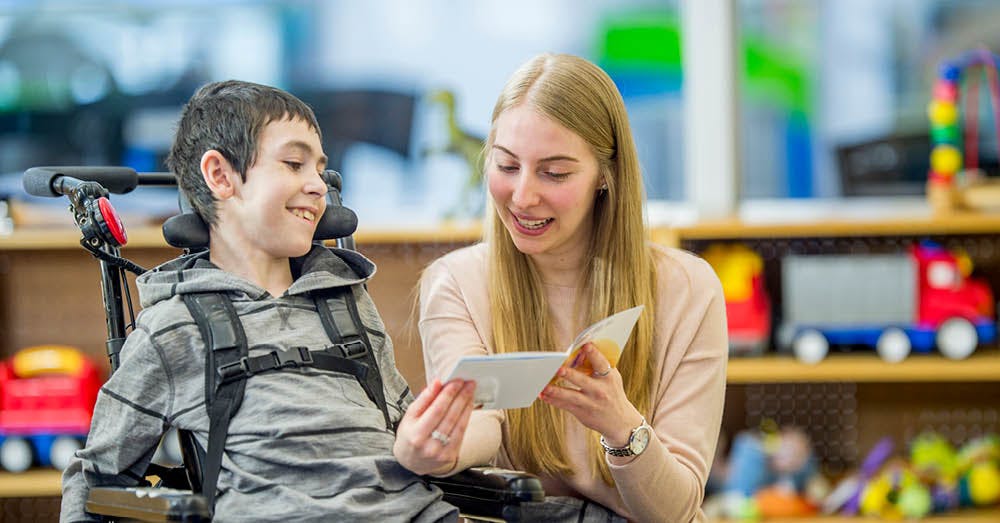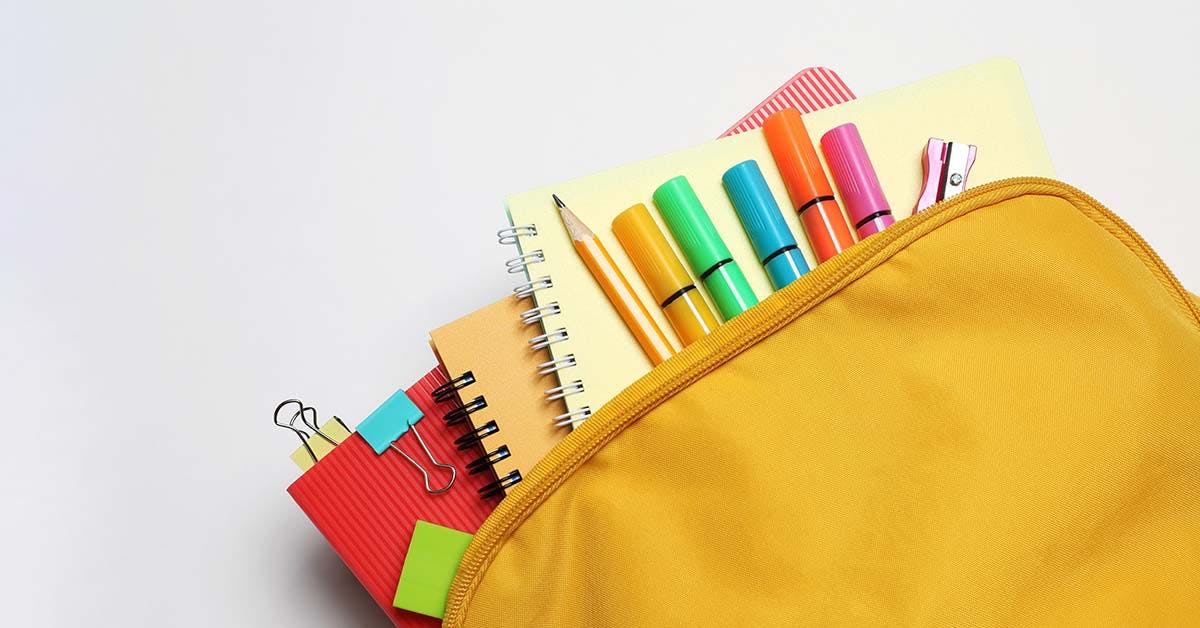28 Dec 2023
How to Support a Child with Autism in the Classroom
Students with autism can present unique challenges for their teachers who need to effectively meet their needs.
It’s vital that teachers are well-equipped to deal with these challenges and are aware of the best practices for supporting children with autism. One of the amazing supports that teachers, parents and children can access is a Teacher’s Aide, who can provide the extra care and attention that autistic children need to succeed.
Working as a Teacher’s Aide with children with disabilities requires appropriate training and experience. In this article, we’ll provide you with a brief overview of how to support a child with autism in a classroom, and the qualifications you’ll need in order to do so.

What is Autism?
Whether you’re already a Teacher’s Aide or you’re thinking about becoming one, it’s vital to understand what autism means, and how it can vary between individuals. So what is autism? Put most simply, autism is a developmental disorder affecting how a child experiences communication, and it involves cognitive difficulties that make it hard to understand the world around them.
Autism is known as Autism Spectrum Disorder or ASD. It is estimated that ASD affects up to 1 in 70 children.
ASD characteristics can range from narrow interests, developmental delay, lack of social and communication skills, and inability to recognise social cues. A child with ASD may often perform repetitive behaviours or movements, have difficulty dealing with large groups or crowds of people and be sensitive to bright light or loud noises.
People with autism can struggle with social interactions, have difficulty with speech and comprehension of words and have trouble dealing with changes in their environment. The scale of difficulty that children with ASD can experience may vary from minor to severe. With the right support, many children with ASD can live relatively normal lives.
How Does Autism Affect Learning in Childcare and Schools?
Autism can bring about a range of challenges in childcare and schools. Schools are not exactly always set up for kids with diverse needs, which is a shame considering that about 1 in 150 Australians has ASD.
Here’s an overview of what difficulties you need to understand when supporting children with autism.
Communication
Kids with ASD particularly experience challenges when it comes to communication. Some children experience delays or challenges in expressive and receptive language skills.
Expressive language skills refer to the ability to communicate thoughts and ideas verbally or through gestures. Children with autism might encounter difficulties in expressing themselves clearly, which can impact their ability to share their needs, feelings, or thoughts with others.
On the other hand, receptive language skills involve understanding and processing spoken or written language. Some children with autism may struggle with comprehending instructions, following conversations, or grasping the meaning of written materials. These challenges in expressive and receptive language skills can influence their social interactions, making it crucial for educators and caregivers to adopt personalised strategies to support effective communication and learning.
Sensory sensitivities
Sensory sensitivities can also pose hurdles, as bright lights, loud noises, or certain textures may be overwhelming for them. For instance, a typical classroom environment with fluorescent lights and various auditory stimuli might be too much for a child with autism. These sensory challenges can lead to discomfort, anxiety, or even meltdowns, affecting the child's ability to engage in learning and social activities.
Changes and transitions
In the classroom, adapting to changes in routine and coping with transitions can be particularly hard for children with ASD who often thrive on predictability and consistency. These difficulties may lead to frustration, or they may withdraw from others, impacting the child's overall learning experience and social engagement.
By integrating suitable autism learning styles and alleviating any discomfort in the classroom, you can help enable autistic children to take part in learning more comfortably and become better prepared for their future.

How can I support a child with Autism in the classroom?
1. Working with parents
The primary carer/s at home may not be trained professionals, but they’ve got a unique and powerful skill set for you to draw upon. They’ve been there since the start — the child’s original number one supporters. They have a running catalogue of the positive and negative reactions to every experience and stimulation, and they know what has worked to help the child so far and what hasn’t.
It’s hugely beneficial to work with parents to help normalise ASD at school and at home, and to create awareness among teaching staff and the child’s peers. If you can work together, it will make a world of difference, providing a sense of understanding and patience that helps the child navigate challenges.
They’ll get you started with some immediate pointers, which particularly helps when it comes to autistic meltdowns in the classroom.
Meltdowns happen when autistic individuals are totally overwhelmed, whether that’s from sensory overload or situations they find distressing. Once they’re feeling that way, the best thing you can do is work with the parents on a plan that minimises the emotional and physical impact on themselves and others.
In the plan, you could make a list of coping strategies like breathing exercises, or practical actions like removing them from the classroom to a prearranged calm environment.
2. Study all assessments
When you meet with a child’s parents, past assessments are some of the best resources you can request from them. Any autism assessment or reports on your students will be quite useful and help you know more about them, so take the time to study it thoroughly.
Having a detailed understanding of what kinds of behaviours or triggers they’ve experienced provides highly reliable information about how to support a child with autism in childcare or school.
3. Communicate with the teacher
As a Teacher’s Aide, a big part of your job is supporting teachers in day-to-day tasks like class planning and exam marking. But you may be the one to provide more one-on-one support to an autistic child in the classroom, so that teachers can still provide great learning experiences to the entire class. That said, you, the teacher, and the parents have a duty to work together to help the autistic child have a positive educational experience. That’s why it’s vital that you and the teacher keep each other in the loop about the education of the autistic child, their needs, progress, and any autism behaviour management strategies.
4. Educate the rest of the class
Children aren’t exactly the most emotionally tactful beings at times. They may not understand the complexities of life and other kids’ experiences just yet, but it’s up to you and the teacher to educate them.
It is highly distressing for an autistic child to be subjected to a classroom of children behaving unkindly or creating triggers like loud noises. So, work with the teacher to explain autism to your class. Help the teacher explain what it is, things they should and shouldn’t do to support their classmate, and generally encourage them to become aware of and empathetic towards the condition.
5. Maintain consistency
Establishing and maintaining a structured routine is crucial in providing a sense of security and stability for these children. You can support students by implementing visual schedules, easy-to-understand communication about upcoming changes, and gradual transitions to help ease the impact of sensory issues and changes in routine. This goes towards creating a more inclusive and supportive learning environment.
6. Individualised instruction
Instruction that meets unique learning needs and preferences is essential for promoting inclusive education for children with autism. By understanding the child's strengths, challenges, and learning style, you can adapt the teacher’s lessons and materials in a way that best fits the child’s learning needs.
This may involve using visual aids, hands-on activities, or breaking tasks into smaller, more manageable steps. Supporting teachers and students in this way ensures that each child receives the accommodations necessary to succeed while building confidence and self-esteem.
7. Positive reinforcement
Positive reinforcement involves acknowledging and rewarding desired behaviours or achievements, which can be highly effective in motivating children with autism. By providing praise, encouragement, or tangible rewards for appropriate actions, educators create a supportive learning environment. This can help to encourage the child to engage in desired behaviours, such as following instructions, participating in activities, or completing tasks independently. Positive reinforcement also helps build self-confidence and a positive attitude towards learning.

How to become a Teacher Aide
You can start working as a Teacher Aide or Teaching Assistant in schools with just a Certificate III in School Based Education Support.
However, if you want to work with autistic children as an Additional Needs Teacher Aide, you’ll need further education and training. The minimum qualification for working with children with disabilities as a Teacher Aide is the Certificate IV in School Based Education Support. See here to find out the daily duties and qualifications of a Teacher’s Aide.
If you want to be part of helping autistic children have a positive schooling experience, check out our range of Teacher Aide courses, or call us on 1300 616 197 and speak to one of our Careers Advisors about your course options.
Related Articles

How Martina’s school excursion led to a thriving career as a Teacher Aide
Meet Martina, one of Foundation Education’s valued Trainers and Assessors in Education Support, and learn her story of becoming a Teacher Aide.

Have you got what it takes to succeed as a Teacher Aide?
We’ve compiled a list of the essential traits and skills that’ll make you stand out in your new career as a Teacher Aide.

Proud member of

© Foundation Education | RTO Number 22557
